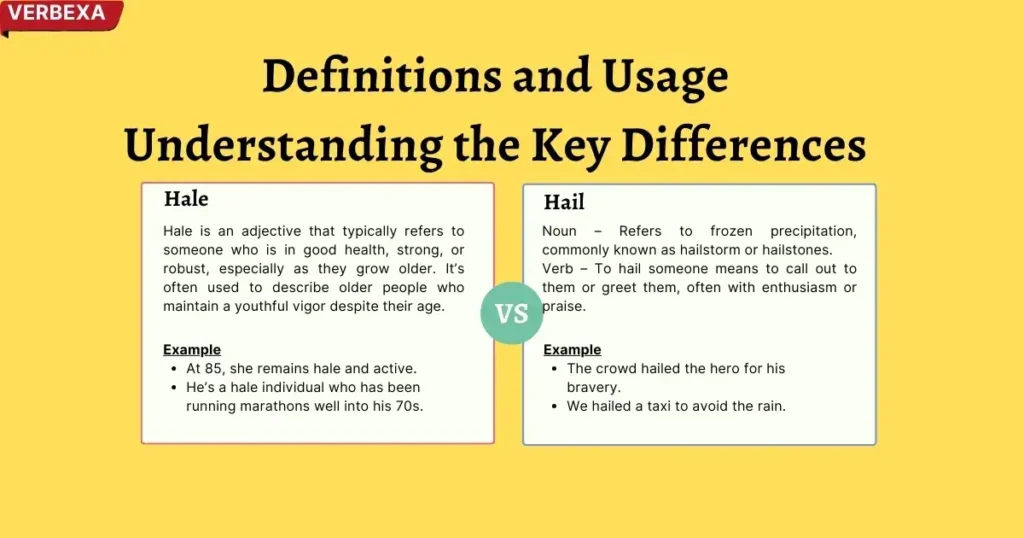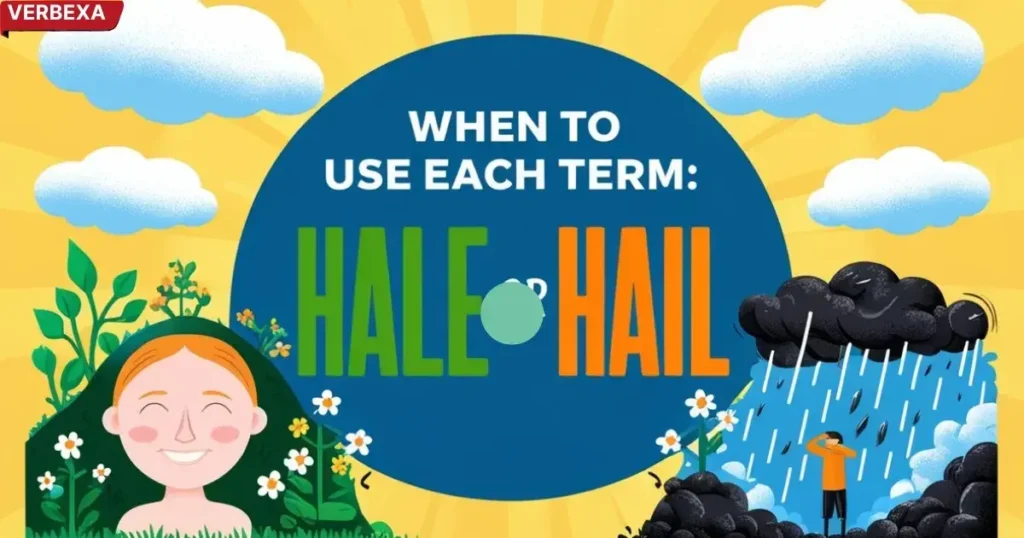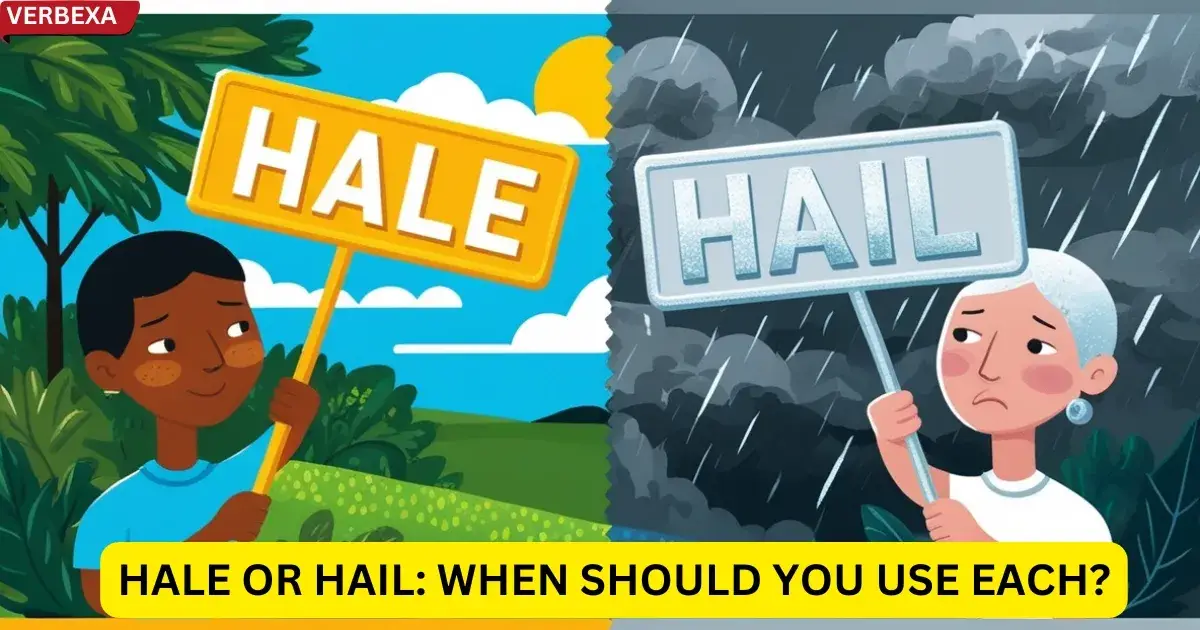The English language is filled with words that sound similar but have different meanings, leading to confusion. One such pair is “hale” and “hail.” While they sound almost identical, their meanings and usage contexts are vastly different. Understanding when to use hail or hale can help you communicate more effectively, whether you’re talking about health, weather, or calling out to someone.
In this article, we’ll dive deep into the differences between hail and hale, provide you with practical examples, and give you tips for choosing the correct term based on context.
Definitions and Usage: Understanding the Key Differences

What Does Hale Mean?
Hale is an adjective that typically refers to someone who is in good health, strong, or robust, especially as they grow older. It’s often used to describe older people who maintain a youthful vigor despite their age.
Example Sentences Using Hale:
- At 85, she remains hale and active.
- He’s a hale individual who has been running marathons well into his 70s.
What Does Hail Mean?
Hail, on the other hand, has multiple meanings:
- Noun – Refers to frozen precipitation, commonly known as hailstorm or hailstones, which are small pellets of ice that fall from the sky during certain weather conditions. Example Sentences Using Hail as a Noun:
- The hail from the storm dented my car.
- The crops were ruined due to a heavy hail shower last night.
- Verb – To hail someone means to call out to them or greet them, often with enthusiasm or praise. It can also mean to give someone or something public acclaim. Example Sentences Using Hail as a Verb:
- The crowd hailed the hero for his bravery.
- We hailed a taxi to avoid the rain.
Why Are Hale and Hail Often Confused?
Because hail and hale are homophones (words that sound alike but have different meanings), they’re frequently mixed up, especially in spoken language. While their meanings are entirely distinct, the similarity in pronunciation often leads to mistakes, even among fluent English speakers.
Hail and Hale Synonyms:
Synonyms for Hail
- Noun (Weather-related):
- Ice pellets
- Frozen rain
- Hailstones
- Sleet
- Snowballs (in some contexts)
- Verb (Praise-related):
- Greet
- Celebrate
- Applaud
- Cheer
- Praise
- Salute
- Acclaim
- Commend
- Acknowledge
- Welcome
Synonyms for Hale
- Healthy
- Robust
- Strong
- Vigorous
- Fit
- Sturdy
- Hardy
- Sound
- Well
- Active
Side-by-Side Comparison: Hale vs Hail
| Aspect | Hale | Hail |
|---|---|---|
| Definition | Refers to health, vitality, and strength, particularly in older age. | Refers to ice pellets (weather) or calling out with praise. |
| Part of Speech | Adjective | Noun (weather), Verb (calling/praising) |
| Context of Use | Describes people, often older individuals, who are still strong and healthy. | Describes frozen precipitation or an action of calling/praising someone. |
| Example | He is a hale man despite his age. | The hail storm caused significant damage. |
| Synonyms | Healthy, vigorous, fit | Ice, frozen rain (noun); greet, acclaim (verb) |
When to Use Each Term: Hale or Hail?

Use Hale When Talking About Health and Strength
- Hale should be used when referring to someone’s physical condition, particularly their health and strength.
- Common phrases include:
- Hale and hearty – This phrase means someone is in good health.
- He was hale and energetic, despite being in his 80s.
Use Hail When Referring to Frozen Precipitation or Praising Someone
- Hail should be used when describing frozen ice pellets that fall from the sky during storms, or when calling out to someone or offering praise.
- Hail from a storm can cause serious damage.
- The citizens hailed the victorious athletes as heroes.
Additionally, in some expressions like “All hail!”, it refers to an enthusiastic greeting or salute.
Hale or Hail Weather
In hale or hail weather, the term hail is the correct one. When discussing weather events, hail refers to ice pellets, a common form of precipitation during storms. For example:
- The hail caused damage to the roof during last night’s storm.
Everyday Usage Examples: Hail or Hale?
Now that we understand the basics, here are some everyday examples to help solidify your understanding of hail or hale.
- Hale Example:
- At the ripe age of 90, my grandmother remains as hale as ever, still taking long walks every morning.
- Hail Example (Weather-related):
- During the thunderstorm, the hail was so heavy it broke the windows of the car.
- Hail Example (Praise-related):
- The coach was hailed as the greatest strategist of the decade for his remarkable win.
How to Spell Hail
The word hail is spelled H-A-I-L. It refers to both frozen precipitation that falls during storms, as well as the verb meaning to call out to or praise someone. To remember how to spell it, think of the “I” in hail as standing tall, much like the ice pellets that fall from the sky. Whether discussing hail in weather or hailed as a form of praise, the spelling remains consistent.
Conclusion: Hail vs Hale
While hail and hale may sound similar, their meanings differ significantly. Hale describes physical health, vitality, and strength, while hail refers to frozen precipitation or the act of calling out or praising someone. By understanding the context in which each word is used, you can confidently distinguish between hail or hale in any situation.
Whether you’re writing about health, weather, or giving recognition, knowing when to use hail or hale will improve both your speaking and writing skills. All hail or all hale is a phrase that often pops up in discussions of praise or celebration, emphasizing the importance of correct usage. Next time you encounter these words, remember the difference, and your language will be all the more precise!

This author is a passionate linguist and grammar enthusiast, dedicated to helping individuals master the art of language. With years of experience in teaching and editing, she brings clarity and precision to every sentence. Tina’s mission is to empower writers of all levels to express themselves with confidence and excellence.

